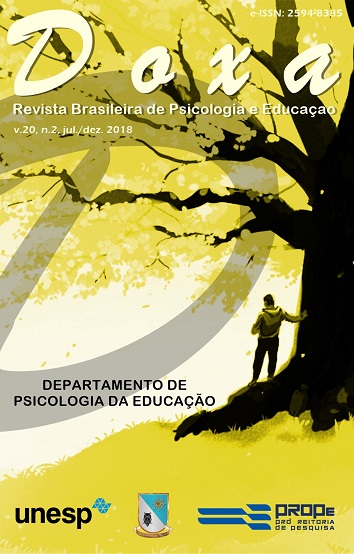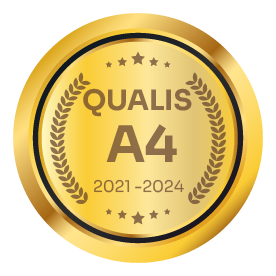Disability in perspective: relationships between social representations and alteration in the community of Jarana in the municipality of Bragança-PA
DOI:
https://doi.org/10.30715/doxa.v20i2.12021Keywords:
Alterity, Social Representations, Deficiency.Abstract
The way we determine the "other" clipping has been problematized in studies in social psychology. Starting from this delimitation, this article will deal with the relationship between the Social Representations and the Otherness of the "other", marked by the lens of the deficiency. In this sense, the general objective of this study is to verify the form (s) assumed by the social representations that are ahead of the meanings of otherness that are built under the aegis of disability in the community of Vila Jarana. This is a qualitative, ethnographic study carried out with a total of 13 students belonging to this community and whose data were subsequently interwoven with the theoretical keys. The results indicate that the social representations, categorized by the students of that community, regarding the concept of disability, lead to formulations of alterity if they are based on exclusion thresholds. In this sense, the conclusion of this article points to the need to rethink how the social representations that have led the social adjustments of the alterity in relation to disability are anchored in addition to a pacified look in dichotomous references and excluding the other under the nickname of disability.
Downloads
References
ALMEIDA. A. M. O. A Era da cognição Social. In: SANTOS. M. F. S.; ALMEIDA. L. M (orgs). Diálogos com a teoria das representações sociais. Editora Universitária da UFPE, 2005.
ALMEIDA. G. J. As Representações Sociais, o Imaginário e a Construção Social da Realidade. In: SANTOS. M. F. S.; ALMEIDA. L. M (orgs). Diálogos com a teoria das representações sociais. Editora Universitária da UFPE, 2005.
ARRUDA, A. Representando a Alteridade. In: JODELET, D. A alteridade como produto e processo psicossocial. Rio de Janeiro: Ed. Vozes, 2002. p. 48-51.
BRANDÃO, C. R. Identidade e etnia. São Paulo: Ed. Brasiliense, 1986. Disponível em: http://pepsic.bvsalud.org/scielo.php?script=sci_arttext&pid=S1678-51771994000100002. Acesso em: 28 jul. 2018.
CHIZOTTI, A. Pesquisa qualitativa em ciências humanas e sociais. 6 ed. Petrópolis: Vozes., 2014.
GIL, A. C. Métodos e técnicas de pesquisa social. São Paulo: Atlas, 2008.
JODELET, D. Alteridade como produto e processo psicossocial, In: ARRUDA, A. (org). Representando a alteridade. 2ª edição. Petrópolis: Editora Vozes, 2013.
JODELET, D. Os processos Psicossociais da Exclusão. In: SAWAIA, B. (org). As artimanhas da Exclusão: analise psicossocial e ética da desigualdade social. 13 ed. Petrópolis: RJ. Editora Vozes, 2013.
MAIOR, I. História, conceito e tipos de deficiência. Portal do Governo do Estado de São Paulo. Disponível em: http://violenciaedeficiencia.sedpcd.sp.gov.br/pdf/textosApoio/Texto1.pdf. Acesso em: 12 abr. 2018.
MAZZOTA, M. J. S. Educação Especial no Brasil: história e políticas públicas. 6 ed. São Paulo: Cortez, 2011.
MUSCOVICI. S. Representando a Alteridade, In: Arruda, A. (org). Representando a alteridade. 2 ed. Petrópolis: Editora Vozes, 1998.
MUSCOVICI. S. Representações sociais. Investigação em Psicologia Social. 11 ed. Rio de Janeiro, 2015.
PEIRANO, M. Etnografia, ou a teoria vivida. Ponto Urbe. 2008. Disponível em: file:///C:/Users/pc/Downloads/pontourbe-1890.pdf. Acesso em: 16 abr. 2018.
SATO, L.; SOUZA, M. P. R. Contribuindo para desvelar a complexidade do cotidiano através da pesquisa etnográfica em Psicologia. Disponível em: http://www.revistas.usp.br/psicousp/article/view/63371/66114. Acesso em: 29 mar. 2018.
SOUZA, S. B. Deficiência: A trajetória de uma concepção. Journal of Research in Special Educational Needs, v. 16, n. 1, p. 366-370, 2016.
SKLIAR, C. A invenção e Exclusão da Alteridade “deficiente” a partir dos significados da normalidade. Educação Realidade. v. 24, n. 2, p. 15 – 32, 1999. Disponível em: http://seer.ufrgs.br/index.php/educacaoerealidade/article/view/55373. Acesso em: 29 de mar. 2018.











